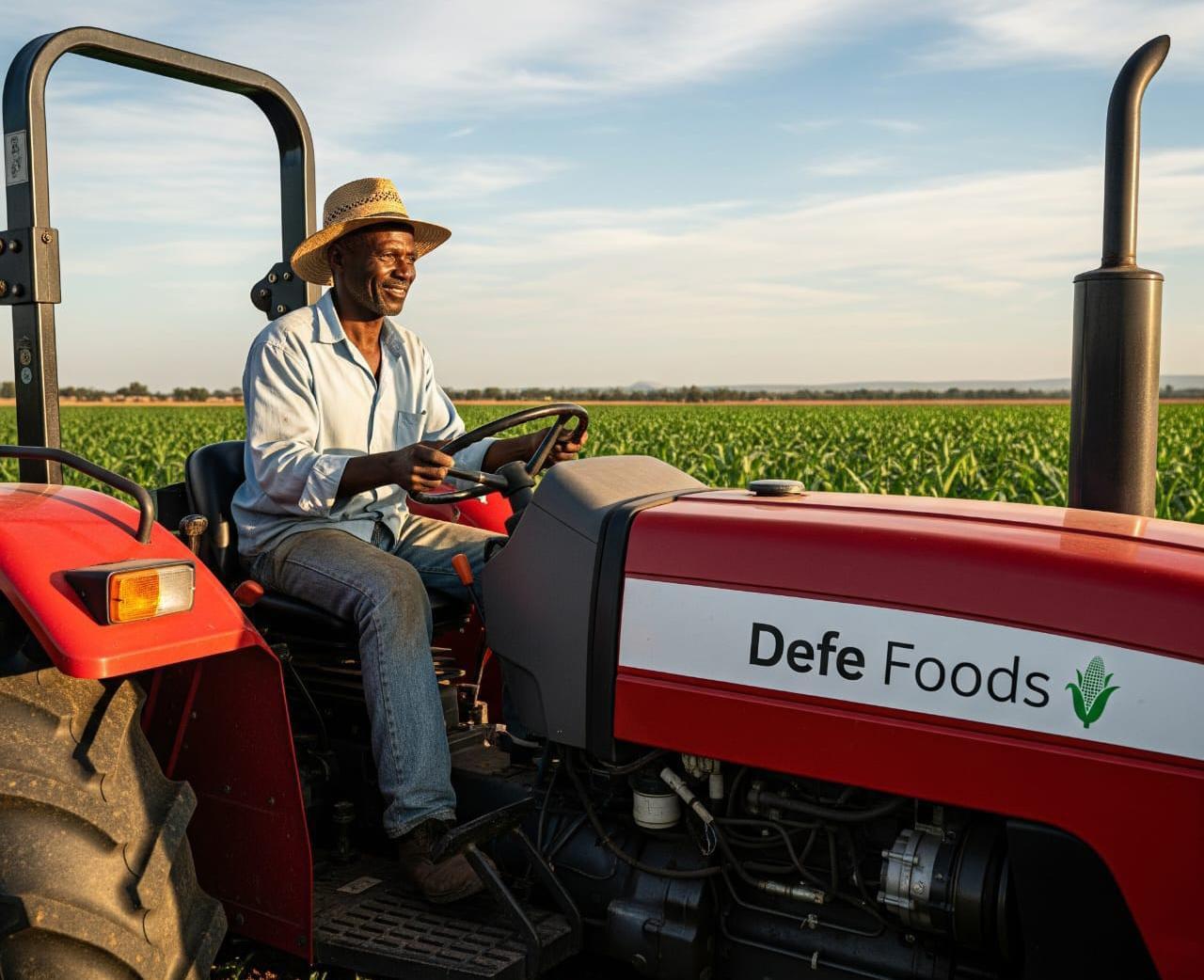The equipping plan for Defe Foods Co-op begins with empowering local farmers who supply the co-op to increase both their productivity and quality of produce. Individual farmers will be equipped with small-scale machinery and tools suited for on-farm use, such as oilseed presses for pre-processing sunflower, small maize shellers, and irrigation equipment. These are provided on an ownership or lease-to-own basis, enabling farmers to handle the first stages of processing and reduce losses before delivery to the central plant.
For larger and more capital-intensive equipment, the co-op will maintain a shared pool of resources accessible to members. This includes high-capacity tractors, combine harvesters, threshers, bean graders, and fishery equipment, all managed under a cooperative scheduling system. Farmers book access to this equipment based on seasonal crop cycles, ensuring fairness and efficiency. The co-op will also provide technical staff to operate complex machines, reducing the burden on individual farmers and guaranteeing optimal use.
This blended approach—personal equipment for routine needs and shared equipment for high-value tasks—allows the co-op to maximize productivity while keeping costs manageable for smallholder farmers. By pooling resources, farmers who could not individually afford advanced machinery gain access to tools that significantly boost yields and quality.
The debenture funding is transformative in this context, as it enables bulk purchase and maintenance of modern machinery without straining farmer finances. With equipment readily available, efficiency increases across all stages of production, from planting and harvesting to post-harvest handling. Output rises as farmers can cultivate larger plots, process crops faster, and deliver higher-quality produce to the processing plant. In turn, this strengthens the plant’s supply chain, increases volumes for processing, and boosts revenues for both farmers and the co-op as a whole.
The result is a cycle of growth where investment in equipment enhances farmer capacity, farmer supply sustains the processing plant, and the plant’s success secures returns for investors and long-term prosperity for the community.
For larger and more capital-intensive equipment, the co-op will maintain a shared pool of resources accessible to members. This includes high-capacity tractors, combine harvesters, threshers, bean graders, and fishery equipment, all managed under a cooperative scheduling system. Farmers book access to this equipment based on seasonal crop cycles, ensuring fairness and efficiency. The co-op will also provide technical staff to operate complex machines, reducing the burden on individual farmers and guaranteeing optimal use.
This blended approach—personal equipment for routine needs and shared equipment for high-value tasks—allows the co-op to maximize productivity while keeping costs manageable for smallholder farmers. By pooling resources, farmers who could not individually afford advanced machinery gain access to tools that significantly boost yields and quality.
The debenture funding is transformative in this context, as it enables bulk purchase and maintenance of modern machinery without straining farmer finances. With equipment readily available, efficiency increases across all stages of production, from planting and harvesting to post-harvest handling. Output rises as farmers can cultivate larger plots, process crops faster, and deliver higher-quality produce to the processing plant. In turn, this strengthens the plant’s supply chain, increases volumes for processing, and boosts revenues for both farmers and the co-op as a whole.
The result is a cycle of growth where investment in equipment enhances farmer capacity, farmer supply sustains the processing plant, and the plant’s success secures returns for investors and long-term prosperity for the community.
The equipping plan for Defe Foods Co-op begins with empowering local farmers who supply the co-op to increase both their productivity and quality of produce. Individual farmers will be equipped with small-scale machinery and tools suited for on-farm use, such as oilseed presses for pre-processing sunflower, small maize shellers, and irrigation equipment. These are provided on an ownership or lease-to-own basis, enabling farmers to handle the first stages of processing and reduce losses before delivery to the central plant.
For larger and more capital-intensive equipment, the co-op will maintain a shared pool of resources accessible to members. This includes high-capacity tractors, combine harvesters, threshers, bean graders, and fishery equipment, all managed under a cooperative scheduling system. Farmers book access to this equipment based on seasonal crop cycles, ensuring fairness and efficiency. The co-op will also provide technical staff to operate complex machines, reducing the burden on individual farmers and guaranteeing optimal use.
This blended approach—personal equipment for routine needs and shared equipment for high-value tasks—allows the co-op to maximize productivity while keeping costs manageable for smallholder farmers. By pooling resources, farmers who could not individually afford advanced machinery gain access to tools that significantly boost yields and quality.
The debenture funding is transformative in this context, as it enables bulk purchase and maintenance of modern machinery without straining farmer finances. With equipment readily available, efficiency increases across all stages of production, from planting and harvesting to post-harvest handling. Output rises as farmers can cultivate larger plots, process crops faster, and deliver higher-quality produce to the processing plant. In turn, this strengthens the plant’s supply chain, increases volumes for processing, and boosts revenues for both farmers and the co-op as a whole.
The result is a cycle of growth where investment in equipment enhances farmer capacity, farmer supply sustains the processing plant, and the plant’s success secures returns for investors and long-term prosperity for the community.
0 Comments
0 Shares
1K Views
0 Reviews





